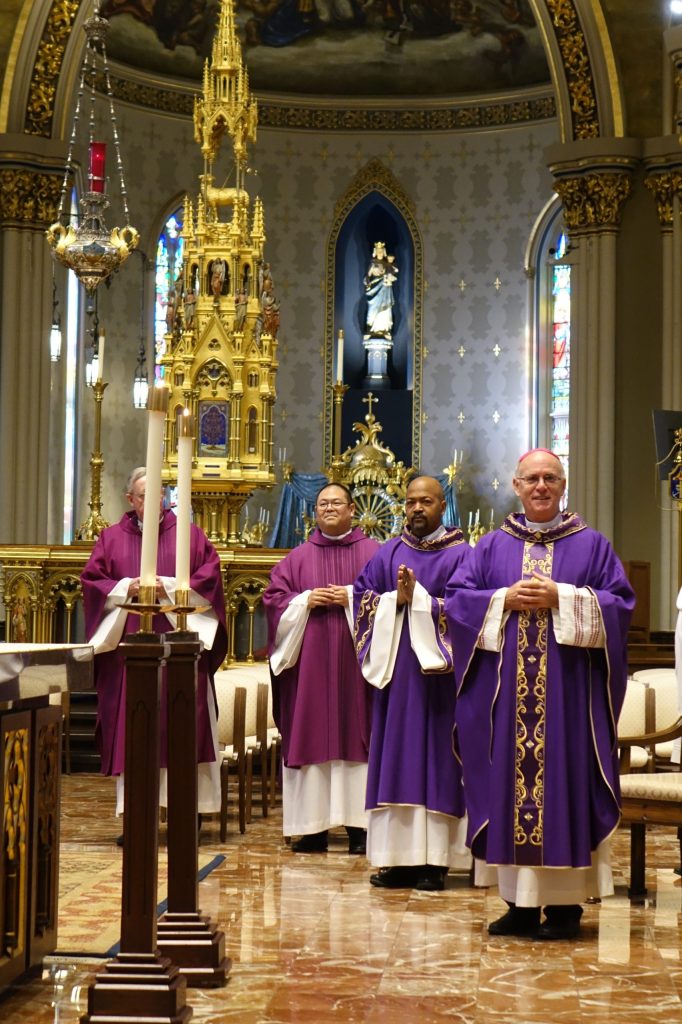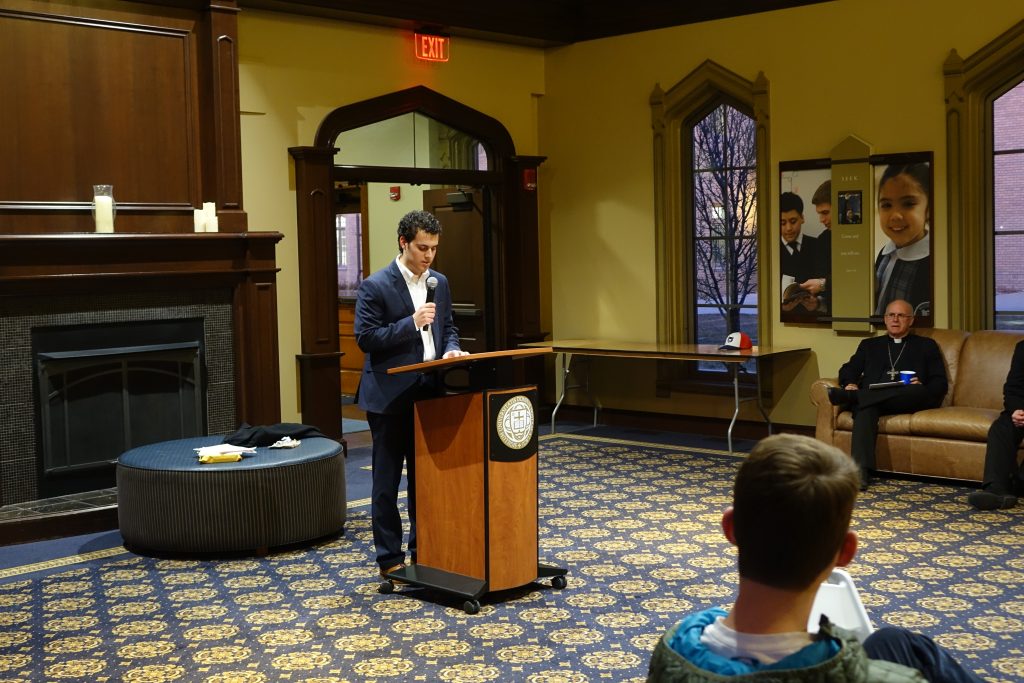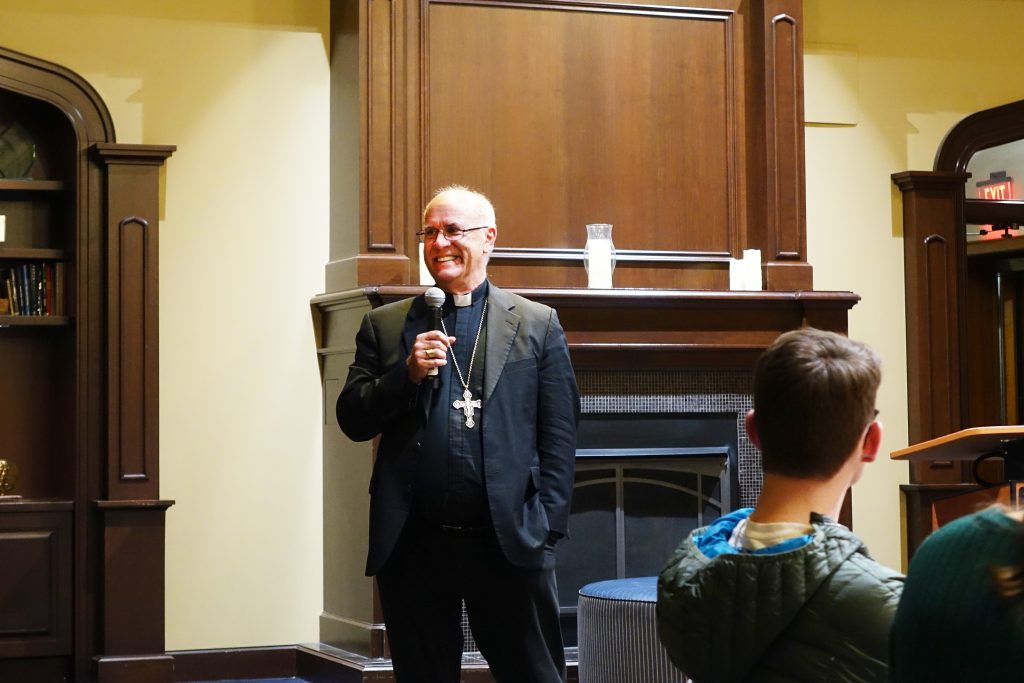March 1, 2024 // Bishop
Bishop Rhoades Speaks on ‘Unwanted Abortions’ at Notre Dame
Bishop Rhoades remembers being a high school student when the Supreme Court decided the landmark abortion case Roe v. Wade. “We were all appalled, like, how could this be?” he recalled.
Times have changed. Today, as a poll in The New York Times shows, more people in the United States identify as “pro-choice” rather than pro-life for the first time in two decades.

Bishop Rhoades addresses the attendees of the Notre Dame Right to Life Club’s Mass on Monday, February 19.
Bishop Rhoades celebrated Mass and spoke at an event sponsored by the University of Notre Dame’s Right to Life Club on Monday, February 19. Though the event was organized by the student club, people of all ages from Notre Dame and the broader community attended. The title of Bishop Rhoades’ talk was “Unwanted Abortions.”
“I suggest that, given the way pro-choice or pro-abortion forces have framed the issue of abortion rights, perhaps we need to do a better job and use some new strategies in how we who are pro-life frame the issue by focusing more on unwanted abortions,” Bishop Rhoades said.
When the Supreme Court overturned Roe in 2022 with its decision in Dobbs v. Jackson Women’s Health Organization, Bishop Rhoades said he was “overjoyed” but concerned about cultural issues. “I was keenly aware, and still am, that the culture of death had not been defeated, and that there was still so much to do to build a culture of life in our nation,” Bishop Rhoades said. “So, my joy over the Dobbs decision was tempered by the realization not only that abortion would continue to be legal in many states but that the minds and hearts of many Americans were still not with us.”

Michael Urban, Student Director of Spirituality for Notre Dame’s Right to Life Club, introduces Bishop Rhoades before the bishop’s lecture.
Yet most abortions aren’t necessarily desired. Bishop Rhoades brought up a poll in a peer-reviewed study he had recently encountered. According to an extensive poll of women who had had abortions, only 33 percent of respondents said their abortions were wanted, and 24 percent even described their abortions as “unwanted” or “coerced.” More than 60 percent reported high levels of pressure from outside sources to abort, and around the same number of women said they would have preferred to give birth if they had had more emotional support or financial security.
Bishop Rhoades said the issue of coercion into abortion has “not received enough attention” in the media or the culture. He brought up examples, including that of celebrity Britney Spears, who had an abortion as a teenager and later wrote, “If it had been left up to me alone, I never would have done it.” Some cases even involve violence. “Women who are pregnant are more likely to die by homicide than die because of sepsis, high blood pressure, or any other medical condition,” Bishop Rhoades related.
Here, the bishop said, is where pro-life programs are vital. Programs such as the U.S. Conference of Catholic Bishops’ Walking with Moms in Need initiative extend help to mothers across the nation. Programs formed for different situations are needed, too. Catholic Charities of the Diocese of Fort Wayne-South Bend has a program in South Bend called ECHO, which helps pregnant teenagers finish high school.

Photos by Kasia Balsbaugh
Bishop Rhoades laughs while answering a question during the Q&A session after his talk on pro-life news at the University of Notre Dame on Monday, February 19.
“No woman should feel forced to choose between her future and the life of her child,” said Bishop Rhoades, who emphasized the need to “practice what we preach.” When researching Indiana laws, Bishop Rhoades said he was convicted to extend parental leave for employees of the Diocese of Fort Wayne-South Bend.
Bishop Rhoades and other pro-life advocates are supporting similar programs in the broader secular arena. Bishop Rhoades said two of the biggest touchpoints are affordable health care and workplace accommodations for pregnant and nursing mothers.
Unfortunately, not all pro-life laws make it. One such law, the Pregnant Students Rights Act, would require colleges and universities to disclose what they are doing to help pregnant students finish their degrees. This legislation was widely opposed, with no Democrats voting for its passage, Bishop Rhoades said.
A law that has been misused is the Pregnant Workers Fairness Act, which requires employers to provide reasonable accommodations for pregnant employees. Some of these accommodations, the bishop said, are simple, such as providing seating for pregnant workers or allowing them to carry water bottles. While the act was signed into law with the support of Catholic bishops, the Equal Employment Opportunities Commission has since used the act to require employers to provide paid leave for abortions. Bishop Rhoades stated firmly that this was not what the bishops had supported. “The intent of the law was to bring pregnant employees accommodations that allowed them to have healthy pregnancies,” Bishop Rhoades said.
And, of course, some acts that are harmful from the beginning. Bishop Rhoades discussed the proposed Women’s Health Protection Act, which would allow abortion at practically any stage of pregnancy nationwide, while disallowing many exemptions for religious liberty.
“The battle for life and the battle for religious liberty are intimately linked, especially in our nation today,” Bishop Rhoades told those in attendance.
Bishop Rhoades also reminded the audience that the idea of religious freedom can never be invoked to support abortion or other immoral acts. “Religious freedom can be exploited, and when it is, it does harm,” Bishop Rhoades said.
Bishop Rhoades ended the Q&A with an exhortation for the young people in the crowd. “I never would have dreamed this when I was your age, that this kind of stuff would be happening,” he said, referencing contemporary attacks on life, sexuality, and the family. “So, it takes a lot more moral courage today for you as young people.”
Gerard Bradley, Professor of Law at Notre Dame, attended Bishop Rhoades’ talk. Bradley said, “The pro-life cause in America – and by ‘pro-life cause’ I mean the project of saving unborn children from death by abortion and of working to make them equally protected by the laws against killing – needs all the help it can get right now. Bishop Rhoades’ talks energized all of us present.”
Bradley added, “[Bishop Rhoades’] unequivocal and articulate pro-life homily and lecture are needed at Notre Dame … to give clear and perspicuous witness to the truth that abortion kills the most defenseless of our brothers and sisters in Christ.”
Michael Urban, Student Director of Spirituality for Notre Dame’s Right to Life Club, told Today’s Catholic: “Bishop Rhoades is a talented speaker and always has great words of encouragement for those who are seeking to live out their faith in a world that opposes what is true, good, and beautiful. I wanted to have him on campus this semester for Right to Life because his wisdom and experience as a shepherd of the Church can provide lots of advice and inspiration to pro-life Catholic college students like myself.”
In his homily during the Mass, Bishop Rhoades thanked the community for their witness to the dignity of all life. “I am deeply grateful to you who are members of the Right to Life Club, and university faculty for life here at Notre Dame. And you who refuse to stand idly by when the lives of our neighbors in the womb, our brothers and sisters, are at stake. You are committed to their protection, to the support of their mothers who are so often pressured and coerced to have abortions.”
The Gospel reading for the Mass, which Bishop Rhoades called “appropriate,” was the Last Judgment in Matthew 25: “I was hungry and you gave me food, thirsty and you gave me drink.”
“Certainly, we can add to that list others who are vulnerable: the unborn, the disabled, and the elderly,” Bishop Rhoades said in his homily. “What we do to them, we do to Jesus. What we fail to do for them, we fail to do for Jesus.”
The best news. Delivered to your inbox.
Subscribe to our mailing list today.






